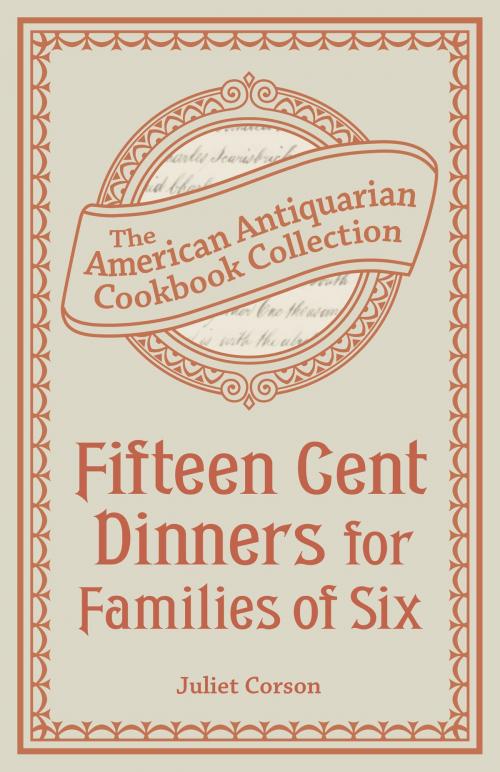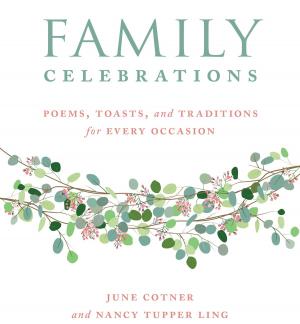| Author: | Juliet Corson | ISBN: | 9781449428082 |
| Publisher: | Andrews McMeel Publishing | Publication: | October 16, 2012 |
| Imprint: | Andrews McMeel Publishing | Language: | English |
| Author: | Juliet Corson |
| ISBN: | 9781449428082 |
| Publisher: | Andrews McMeel Publishing |
| Publication: | October 16, 2012 |
| Imprint: | Andrews McMeel Publishing |
| Language: | English |
Self published by the founder of the New York Cooking School, this forty-page leaflet was designed to educate new immigrant families with low incomes about preparing good, healthy meals. As the industrial revolution gathered steam and reformers focused on living conditions of the poor and disadvantaged, economical themes began to appear in cookbooks, and Corson’s pamphlet was extremely popular. In addition to numerous recipes and food preparation techniques, the book contains a “Daily Bill of Fare for One Week”—seven days of menus that cost $2.53 in total leaving a balance of $.62 for extra bread, milk, and butter. The little volume also contains favorable reviews of the book from contemporary publications, and an “ad” for six other books by Corson. The title page contains the following quote from the author: “This little book may not be a welcome guest in the home of the man who fares abundantly every day; it is not written for him; but to the working man, who wants to make the best of his wages, I pray it may bring help and comfort.”
This facsimile edition of Juliet Corson’s Fifteen Cent Dinners for Families of Six was reproduced by permission from the volume in the collection of the American Antiquarian Society, Worcester, Massachusetts. Founded in 1812 by Isaiah Thomas, a Revolutionary War patriot and successful printer and publisher, the Society is a research library documenting the life of Americans from the colonial era through 1876. The Society collects, preserves, and makes available as complete a record as possible of the printed materials from the early American experience. The cookbook collection includes approximately 1,100 volumes.
This facsimile edition of Juliet Corson’s Fifteen Cent Dinners for Families of Six was reproduced by permission from the volume in the collection of the American Antiquarian Society, Worcester, Massachusetts. Founded in 1812 by Isaiah Thomas, a Revolutionary War patriot and successful printer and publisher, the Society is a research library documenting the life of Americans from the colonial era through 1876. The Society collects, preserves, and makes available as complete a record as possible of the printed materials from the early American experience. The cookbook collection includes approximately 1,100 volumes.
Self published by the founder of the New York Cooking School, this forty-page leaflet was designed to educate new immigrant families with low incomes about preparing good, healthy meals. As the industrial revolution gathered steam and reformers focused on living conditions of the poor and disadvantaged, economical themes began to appear in cookbooks, and Corson’s pamphlet was extremely popular. In addition to numerous recipes and food preparation techniques, the book contains a “Daily Bill of Fare for One Week”—seven days of menus that cost $2.53 in total leaving a balance of $.62 for extra bread, milk, and butter. The little volume also contains favorable reviews of the book from contemporary publications, and an “ad” for six other books by Corson. The title page contains the following quote from the author: “This little book may not be a welcome guest in the home of the man who fares abundantly every day; it is not written for him; but to the working man, who wants to make the best of his wages, I pray it may bring help and comfort.”
This facsimile edition of Juliet Corson’s Fifteen Cent Dinners for Families of Six was reproduced by permission from the volume in the collection of the American Antiquarian Society, Worcester, Massachusetts. Founded in 1812 by Isaiah Thomas, a Revolutionary War patriot and successful printer and publisher, the Society is a research library documenting the life of Americans from the colonial era through 1876. The Society collects, preserves, and makes available as complete a record as possible of the printed materials from the early American experience. The cookbook collection includes approximately 1,100 volumes.
This facsimile edition of Juliet Corson’s Fifteen Cent Dinners for Families of Six was reproduced by permission from the volume in the collection of the American Antiquarian Society, Worcester, Massachusetts. Founded in 1812 by Isaiah Thomas, a Revolutionary War patriot and successful printer and publisher, the Society is a research library documenting the life of Americans from the colonial era through 1876. The Society collects, preserves, and makes available as complete a record as possible of the printed materials from the early American experience. The cookbook collection includes approximately 1,100 volumes.
More books from Andrews McMeel Publishing
We use our own "cookies" and third party cookies to improve services and to see statistical information. By using this website, you agree to our Privacy Policy















